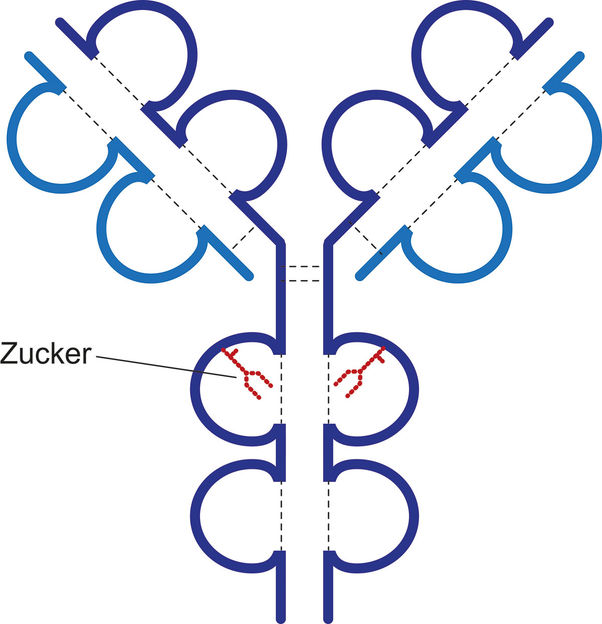Sugar governs how antibodies work in the immune system
Advertisement
antibodies protect the body against diseases – but can also harm their own organism if the reactions are misdirected. Researchers from the University of Zurich have now discovered that a particular sugar in the antibodies determines whether one of the body’s own cells is destroyed or not. This result could lead to new treatment possibilities for patients with autoimmune diseases.

Antibodies are molecules with a Y-shaped structure. Sugar structures (red) coupled with the antibody protein play a key role in the function of antibodies. The presence of sialic acid in the sugar causes antibodies to attack and destroy their target cells less aggressively.
UZH
The immune system is our biological defense shield. Antibodies protect the organism against invading pathogens such as viruses or bacteria. In the case of certain autoimmune diseases, however, this defense behavior is misdirected: The antibodies don’t just target foreign substances; they also attack the body’s own cells. Once the antibody binds to the cell surface, they can activate specific proteins, so-called complement factors, which can damage the cell membrane and thus kill the cell.
Sialic acid protects from antibody-induced cell killing
A team of researchers headed by Professor Jan Lünemann from the Institute of Experimental Immunology at the University of Zurich has now discovered that a particular sugar structure in the antibody plays a key role in the complement-dependent destruction of the body’s own tissue. Antibodies consist of protein and coupled sugar groups. Earlier studies revealed that antibodies with the sugar structure sialic acid are detectable more rarely in patients suffering from autoimmune diseases than in healthy people.
«We observed that patients suffering from an autoimmune disease felt better the more sialic-acid-carrying antibodies they had in their blood», reports Isaak Quast, a doctoral student in Lünemann’s group and the study’s first author. Different versions of antibody-coupled sugar structures were produced in the lab. «We managed to demonstrate that antibodies containing the sugar sialic acid only destroy the body’s own cells to a very limited extent. Our data indicates that the coupling of sialic acid to antibodies might be a potential strategy in treating patients with autoimmune diseases», summarizes Lünemann.
Original publication
Other news from the department science
Most read news
More news from our other portals
See the theme worlds for related content
Topic world Antibodies
Antibodies are specialized molecules of our immune system that can specifically recognize and neutralize pathogens or foreign substances. Antibody research in biotech and pharma has recognized this natural defense potential and is working intensively to make it therapeutically useful. From monoclonal antibodies used against cancer or autoimmune diseases to antibody-drug conjugates that specifically transport drugs to disease cells - the possibilities are enormous

Topic world Antibodies
Antibodies are specialized molecules of our immune system that can specifically recognize and neutralize pathogens or foreign substances. Antibody research in biotech and pharma has recognized this natural defense potential and is working intensively to make it therapeutically useful. From monoclonal antibodies used against cancer or autoimmune diseases to antibody-drug conjugates that specifically transport drugs to disease cells - the possibilities are enormous




























































